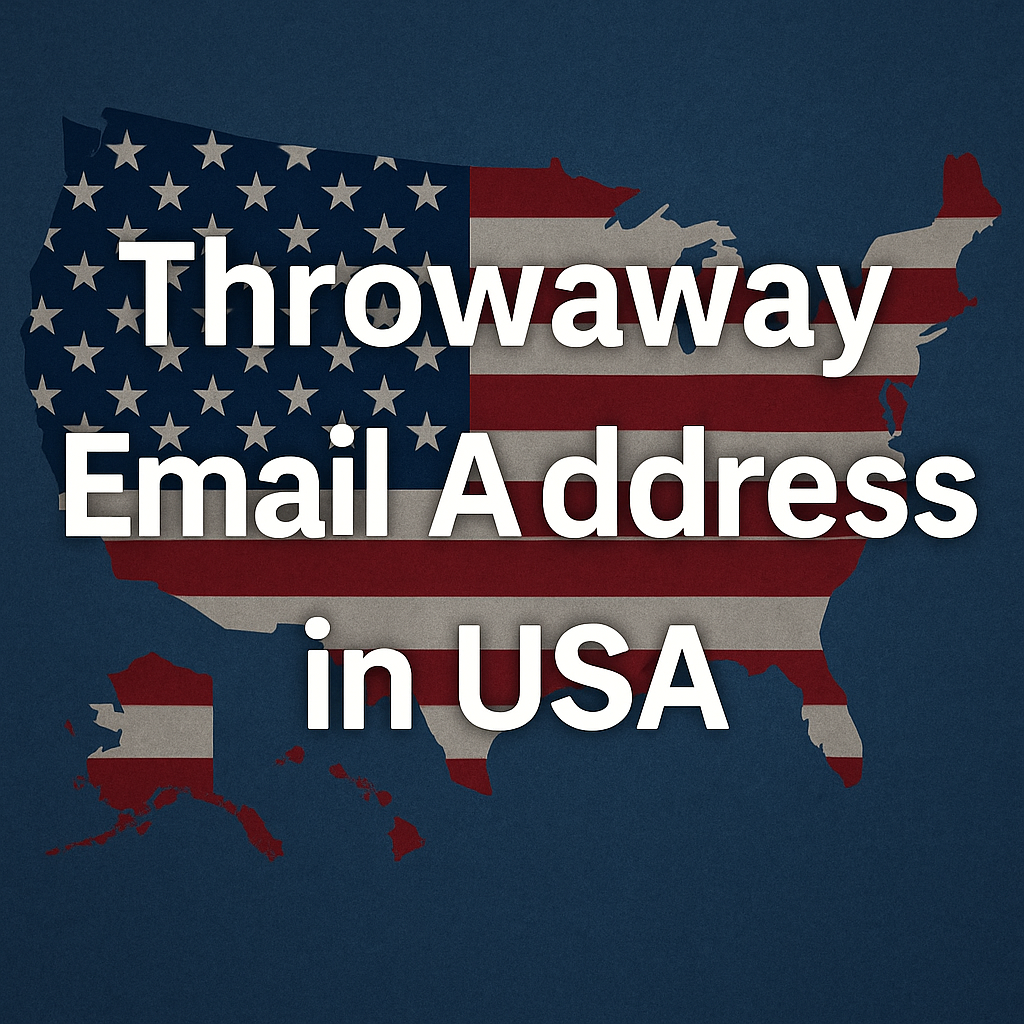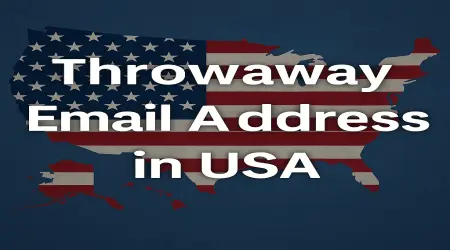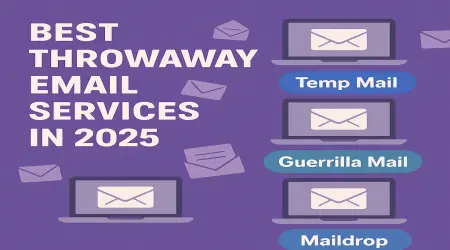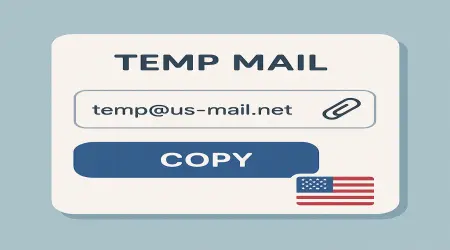

Throwaway email address in USA
A throwaway email address is a modern necessity for internet users who wish to protect their privacy, avoid spam, and maintain a clean digital footprint. In a time when websites, applications, and platforms require email verification for even the simplest interactions, many users feel overwhelmed by constant promotional messages, subscription traps, and unsolicited offers. The throwaway email address serves as a barrier between personal identity and public exposure, allowing users to engage online without compromising security or privacy.
Using a throwaway email address can be the smartest decision when signing up for newsletters, accessing gated content, downloading free software, or participating in forums. These addresses offer temporary functionality and are typically designed to expire after a certain time or session, meaning no long-term commitment and no risk of being flooded with junk mail later. Unlike permanent email addresses like Gmail or Outlook, throwaway emails are created instantly, without the need for verification, passwords, or personal data.
Many internet users appreciate the simplicity of throwaway email services. They are often accessible directly from a website homepage where a temporary address is automatically generated and ready for use. This generated address is connected to a public or semi-private inbox where the user can check for verification codes, activation links, or one-time passwords. After a few minutes to a few hours, the address becomes inactive or self-destructs, ensuring complete anonymity and zero digital trail. This feature is especially useful for users dealing with services that are known to sell or share personal information.
Online privacy has become a growing concern as data breaches, spam marketing, and phishing attacks are on the rise. Users who once shared their primary email with every new website are now facing thousands of unread spam messages. Some have even fallen victim to scams that originated from leaked email databases. The throwaway email address offers a solution to this escalating issue. Instead of giving away your permanent contact information, you can use a temporary alias that works just long enough to complete your action, and then disappears.
Web developers and software testers frequently use throwaway email addresses during testing phases. Whether it's to check email-based authentication systems or to simulate user signups, these disposable inboxes offer a fast and clean way to conduct email-related tests without cluttering a real inbox. Additionally, students who need to register for academic platforms, free eBooks, or online journals also rely on these temporary accounts to get one-time access without subscribing to lifelong promotional emails.
Throwaway email addresses are also crucial for protecting identity on social media platforms. Many social sites and discussion boards ask for email verification to prevent bots or fake profiles. While this is an important security measure, it often leads to excessive email notifications. A throwaway address solves this by giving you temporary access while shielding your real inbox. This is especially valuable when interacting with controversial or sensitive topics where users may not want to disclose their real identity or location.
Some people mistakenly believe that throwaway email services are unsafe or unreliable, but most reputable providers use encryption, secure inboxes, and anonymous protocols. These services are constantly updated to handle spam filters, protect user activity, and prevent unwanted tracking. While they may lack the full feature set of Gmail or Yahoo, they are not meant to replace personal email accounts. Instead, they are a complement to your primary address—something you use when privacy, speed, and security matter most.
Another popular use case is bypassing article limits or paywalls that allow access only after email registration. News websites, research journals, and entertainment platforms often require users to enter an email before continuing. Instead of filling your inbox with unwanted emails, you can generate a throwaway address and gain entry without giving away your real email. This method respects your need for privacy while still allowing access to information.
Mobile apps, especially free-to-download ones, often request email sign-up to unlock full features. In such cases, a throwaway email address becomes an invaluable tool for quick registration. App developers collect emails to build user databases, send update notifications, or launch marketing campaigns. Users who are cautious about data privacy find comfort in knowing they can sign up without giving away their actual email. The throwaway account provides access without obligation or data exposure.
Online dating websites and classified ad platforms also pose a risk to users’ email privacy. When you post personal ads or communicate with strangers, the last thing you want is to reveal your real contact information. Temporary email services can be used to filter communications before deciding whether to move the conversation to a more permanent platform. This method reduces the risk of harassment, spam, or unwanted tracking from other users.
Job search websites, freelancing platforms, and career boards are notorious for collecting user data, often reselling it to third parties. People looking for one-time applications, company research, or test uploads can use throwaway email addresses to prevent being contacted repeatedly. In fact, some freelance professionals use these emails for client onboarding until a relationship is established. Once verified, they can safely share their main contact info.
Shopping online with coupon websites, giveaways, and flash sale platforms often requires email verification. Marketers know that people love free deals and will give away their email addresses for a small reward. Unfortunately, this opens the door to thousands of future marketing messages. By using a throwaway email, you can get your coupon or gift and walk away with no further obligations. It is a win-win solution that lets you enjoy the perks without the spam.
Gaming platforms also use email addresses to validate users, send in-game rewards, or notify updates. If you’re testing a new game, accessing a beta version, or joining a gaming forum, using a temporary email can protect you from long-term email chains. These throwaway inboxes serve their purpose during registration and can be discarded afterward. Gamers who want to avoid spam from dozens of game updates and newsletters find this method extremely useful.
In academic circles, students and researchers often need access to course materials or conference resources that require quick registration. Instead of signing up with a university email or personal account, they can use a throwaway email address. This is especially handy when the service is used only once or is not affiliated with their regular academic environment. The throwaway solution saves time, keeps things organized, and minimizes distractions.
For people who run multiple online businesses, each requiring a separate email identity for contact forms, customer support, or API access, throwaway email addresses can act as placeholders until the system is fully live. During testing and early access, these disposable accounts help business owners set up operations without revealing their personal or business email accounts.
While throwaway emails are great for privacy, they do have limitations. They are not designed for long-term use or for storing important messages. Most services auto-delete inbox content after a few minutes or hours. They lack advanced spam filters, folder management, or backup features. Therefore, users should never use them for financial transactions, banking, sensitive logins, or password recovery emails.
The best practice is to use a throwaway email only when you are certain that the communication is one-time or non-critical. If there is a chance you’ll need to recover the message or revisit the email, then it's safer to use a dedicated personal or business account. The throwaway model is based on short-term utility, which is perfect for low-risk, high-frequency interactions that don’t require follow-up.
In terms of availability, there are dozens of reliable throwaway email services that are browser-based, mobile-friendly, and accessible worldwide. Some allow you to customize the email prefix, others let you pick the domain. Advanced services even offer inbox search, domain whitelisting, or dark mode for better usability. Depending on your needs, you can select from basic services like Mailinator or more private ones like AnonAddy or SimpleLogin.
Many temporary email services offer browser extensions, allowing users to generate addresses directly from the toolbar. These plugins integrate with Chrome or Firefox and automatically fill email forms with a fresh address. This eliminates manual copy-paste and improves workflow for users who frequently test websites or create test accounts. It also helps people who want to use multiple identities across various platforms.
Security is an important aspect to consider. While most throwaway email providers promise anonymity, it's wise to choose services that don’t log IP addresses or track usage history. Some advanced platforms offer end-to-end encryption, domain blocking, and custom rules. Users concerned with online surveillance or corporate tracking should explore such secure services that prioritize user safety.
Marketers and affiliate professionals sometimes use throwaway emails to verify their own sales funnels, lead forms, or autoresponders. It helps them test the full flow of their email marketing campaigns without using personal or brand email addresses. In doing so, they prevent clutter in their main inbox and reduce risks related to bad scripts or broken links.
The throwaway email address is no longer a niche tool for developers or hackers—it has become a mainstream solution for anyone who values control over their digital presence. Whether you are browsing casually, registering for a webinar, downloading a free course, or just trying to read an article without subscribing, throwaway emails offer freedom, speed, and peace of mind. They are the digital equivalent of a one-time-use mask that you wear to protect your identity in crowded online environments.
More people now understand that digital hygiene is as crucial as physical hygiene. Just as you wouldn’t hand out your home address to every stranger, you shouldn’t give away your real email to every website. The throwaway email concept empowers users to create temporary doors to access services, content, and apps without exposing their real identity. It is privacy made practical, and in an age where every click matters, it gives the power back to the user.




